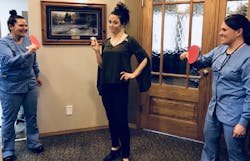Down-and-dirty tasks of dental life: Dealing with no-shows and patients who play dentist Ping-Pong
Dr. Stacey Simmons says in a perfect world, we'd have patients flocking to our dental offices in droves and loving our team members and us. In reality, these patients really do exist; they just don't comprise the entire patient base. It’s those variety-is-the-spice-of-life patients who continually keep us on our toes.
Editor's note: This article first appeared in Breakthrough Clinical, the clinical specialties newsletter created just for dentists. Browse our newsletter archives to find out more and subscribe here.
In a perfect dental world ...
... we would have patients walking through our doors and absolutely falling in love with our front desk team, our assistants, our hygienists, and—of course—us. I mean, after all, we’re the doctors, so who wouldn’t love to get to know us, listen to everything we have to say, accept all of our treatment plans without question, pay cash for every appointment (or at least have a decent insurance plan), never be late to an appointment, and subsequently tell all their family members and friends just how wonderful we are?
In reality ...
... these patients really do exist, but they don’t comprise the entire patient base. The "variety-is-the-spice-of-life" patients are the ones who keep us on our toes. Here are a couple of recent experiences I’ve had in my practice ...
👟 An 18-year-old high-school senior and her mom ...
... both confirmed the student's hygiene appointment for the next day. Her scheduled appointment time rolled around and wouldn’t you know it ... no patient. Hmm. As it turned out, the 18-year-old had gone home after school and forgotten to tell her mom or let us know that she wouldn’t be keeping her appointment. Apparently, she "didn't feel like going to the dentist."
OK, I get that. I don’t want to do a lot of things either, but that doesn’t mean I forget my manners. "Adulting" it can be tough sometimes, right?!
Per our office policy, my amazing front desk team kindly let the mom know she needed to make a deposit on their account before she and her daughter would be able to schedule an appointment again, since this was a repeat [and documented] offense. Our policy for no-shows is not a secret—it’s on the paperwork our patients sign, and it’s posted at the front desk.
So, what does the mom do? She got really upset at us instead of focusing on the issue between her daughter and herself and their own lack of responsibility.
👟 A middle-aged woman ...
had been a patient in my practice for four years. Without word or reason, she transferred to another dentist. I completely understand that sometimes the patient-doctor relationship doesn’t work, and it can be somewhat uncomfortable for a patient to talk about it. When this happens, I often wonder if my staff or I said or did something to offend the patient, but I usually just try to respect the patient's decision and leave it at that.
Well, in this particular case, four years later this former patient calls and asks to be seen on a limited basis for a problem with a tooth "on the upper left side." I referred her to an endodontist. Simple. But what does the patient do?
That very same day, the patient goes and sees her other dentist for another limited exam on the lower left side (she had not mentioned anything about the lower left side to me). Ironically, she again is referred to a specialist for assessment of the same things: symptomatic cracks with a questionable prognosis. Something is definitely going on here.
Subsequently—and understandably so—the patient requests to have a discussion with me about tooth replacement options and overall general dental health, while ping-ponging between dentists. Basically, the patient tells me: "My other dentist said ..."
I’m confused (and albeit somewhat frustrated), the other general dentist is confused, the endodontist is confused, and—of course—the patient is confused. This is a muddled mess!
I tell the patient that she is not being fair to herself or the other parties involved; she needs to make a decision and stick with it. After hearing this, she says that she wants to get a third opinion because nothing makes sense. OK. It may be best that I bow out at this point before everything goes from bad to worse.
These are just two of the many different kinds of situations we face every day in the real live world of dentistry—patients cancelling, seeking multiple opinions, questioning us over the "insurance specialists'" denial of insurance claims, and so on.
I don’t have all the answersto these all-too-common dilemmas, but I can tell you this with certainty: having written office policies for patients to read and sign is a good thing. And this includes written documentation on payment policies, no-shows, cancellations, filing disclosures, any warranties you offer, etc. Although patients will often sign forms without reading the disclosures, having your office policies in writing is extremely beneficial should there be a question later or a time when you need to validate your position. Sometimes patients can be bullies, but we must always take the high road by being professional, fair, and—if necessary and in the best interests of our practice, our team, and ourselves—willing to terminate the relationship.
I love what I do and I have to tell you that there is never a dull moment. Sure, there are those situations that cause me to shake my head and want to pull out my hair, but I have so many amazing patients who make me smile when I see their names in my schedule. Those are the moments I look forward to and the many reasons why I became a dentist in the first place.
So, let's hear your interesting stories. I’m sure you have some good ones!
Stacey L. Simmons, DDS
Editorial Director, Breakthrough Clinical
LAST MONTH ...
>> Insurance denies once, twice, dentist flexes, KA-POW! and the check arrives
Editor's note: This article first appeared in Breakthrough Clinical, the clinical specialties newsletter created just for dentists. Browse our newsletter archives to find out more and subscribe here.









